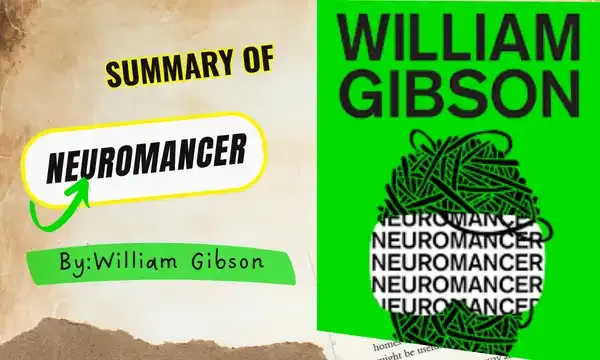Neuromancer is a groundbreaking science fiction novel that explores the themes of cyberspace, artificial intelligence, corporate control, and the blurred boundaries between the virtual and physical worlds.
 |
| Summary of Neuromancer by William Gibson |
The general idea of the Neuromancer book
- Cyberspace and Artificial Intelligence: The book introduces the concept of cyberspace, a virtual reality accessed through computers, and highlights the role of artificial intelligence in shaping this digital landscape.
- Corporate Dominance: Neuromancer portrays a dystopian future where multinational corporations hold immense power, transcending national boundaries and controlling information flow.
- Identity and Reality: The novel delves into the idea of multiple identities and questions the nature of reality as characters navigate between the physical world and the digital realm.
Neuromancer book chapters
- Chiba City Blues: Introduces the protagonist, Case, a former computer hacker who lost his ability to access cyberspace and now works as a low-life hustler in Chiba City, Japan.
- The Shopping Expedition: Case meets Molly, a street-smart mercenary with cybernetic enhancements, hired by a mysterious employer to recruit Case for a job.
- 3Jane: Case is hired by a mysterious employer named Armitage, who offers to restore his hacking abilities in exchange for a dangerous mission: to infiltrate the highly secure AI, Wintermute, alongside Molly and a team of skilled hackers.
- Turing: The team plans their attack on Sense/Net, a powerful corporation holding a highly secure AI core.
- Straylight: The team enters the cyberspace construct of Straylight, unraveling dark secrets about Wintermute and Neuromancer, its enigmatic twin AI.
- The Wage was Never Paid: The plot thickens as alliances shift, and Case faces difficult choices, ultimately leading to a climactic showdown between the AIs and their human allies.
Conclusions Neuromancer book
Technology's Impact: Neuromancer explores the profound influence of technology on society, presenting a cautionary tale about unchecked technological advancement and corporate power.
Visionary Concepts: The novel introduced prescient ideas like cyberspace and virtual reality before these concepts became widely known, shaping the cyberpunk genre and inspiring real-world technology.
Philosophical Questions: Through its complex narrative and characters, Neuromancer delves into philosophical questions about identity, consciousness, and the nature of reality.
About the author of Neuromancer
William Gibson is an American-Canadian science fiction writer known as the "godfather of cyberpunk." His early exposure to computer networks and fascination with technology heavily influenced his work, enabling him to envision and articulate a digital future.
Book Neuromancer for other books
Neuromancer stands as a seminal work in the cyberpunk genre, influencing numerous authors and works. It differentiates itself by combining noir elements, cybernetics, and a gritty, dystopian atmosphere, setting it apart from other cyberpunk novels.
Neuromancer book audience
The book caters to science fiction enthusiasts, cyberpunk fans, and readers intrigued by speculative fiction that explores the intersection of technology, humanity, and societal implications.
Reception or Critical Response to the Book
Neuromancer received widespread critical acclaim upon its publication in 1984. It won the prestigious Hugo, Nebula, and Philip K. Dick awards, solidifying its place in the pantheon of science fiction classics.
Neuromancer book publication date
Neuromancer was published by Ace Books in 1984.
Recommendations for other books
- Snow Crash by Neal Stephenson: A cyberpunk novel exploring the convergence of virtual reality and the physical world, with a fast-paced and action-packed narrative.
- Altered Carbon by Richard K. Morgan: A noir-inspired cyberpunk novel centered around themes of identity, immortality, and advanced technology.
Biggest Takeaway and Point
Neuromancer is a visionary exploration of a dystopian future, featuring cyberspace and artificial intelligence, while raising profound philosophical questions about identity and reality.
